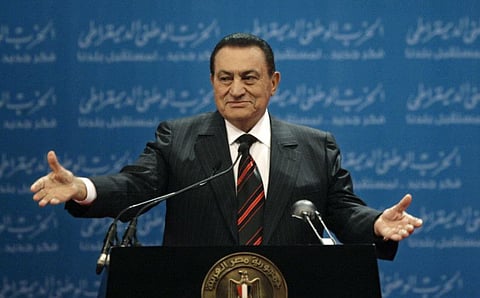Hosni Mubarak: Egypt’s longest-serving ruler
For 30 years, he was a major player on the regional stage

Cairo: Hosni Mubarak, who became Egypt’s longest-serving ruler in more than 150 years before stepping down from office in 2011, has died. He was 91.
His death was announced Tuesday by state TV. No cause was mentioned, although his family recently said he’d been hospitalised.
Mubarak had ruled for 30 years when the so-called “Arab Spring” surged into Cairo in January 2011. After 18 days of mass protests, he stepped down.
Mubarak attended his trial for the alleged killing of protesters by security forces in the final days of his rule in a hospital bed and faced other serious charges, but was only found guilty of fraud and avoided serving additional time in jail.
Military career
Mohammad Hosni Said Mubarak was born on May 4, 1928, in Kafr Al Meselha in the Nile Delta. Opting for a military career when Egypt was still a monarchy, he entered the Air Force Academy in 1950. Four years later, King Farouk was overthrown in a coup led by Gamal Abdul Nasser.
In 1964, Mubarak was appointed head of the Egyptian military delegation to the Soviet Union, the sole supplier of weapons to Nasser’s government. From 1967 to 1972, he served as air force chief of staff, became deputy minister for military affairs and was promoted to air marshal after the 1973 Arab-Israel war.
Also Read: Pictures: Hosni Mubarak's life and times
After Nasser’s death, Egypt was led by President Anwar Sadat, who appointed Mubarak as vice president in April 1975, effectively designating him as heir apparent. That succession came earlier than expected, with Sadat gunned down by fundamentalists on October 6, 1981, during an annual parade marking the 1973 war anniversary. Sadat was killed while Mubarak, seated next to him, escaped with a hand wound.
Mubarak cracked down on violent groups and went on to govern in a low-key, stolid style that contrasted with the glitter of the Sadat years.
In the late 1980s, the country was on the verge of bankruptcy when it stopped paying its foreign debts. It was only when Mubarak agreed to send forces as part of the US-led coalition to expel Iraqi troops from Kuwait in 1990 that creditors agreed to write off debts.
In 2004, Mubarak appointed a government that revived the sale of state assets. By 2009, it attracted more than $40 billion of foreign direct investment in industries such as oil and gas, and telecommunications. Emirates Telecom Corp. and Italian bank Intesa Sanpaolo SpA were drawn to the country.
Key alliance
He retained Egypt’s alliance with the US, which began with Sadat’s noisy break with the Soviet Union. Egypt receives about $1.3 billion a year in US military aid.
Mubarak presided over several years in which domestic Islamic extremism flared in Egypt. In 1997, violence reached a zenith when 58 foreign tourists in Luxor were gunned down. The massacre, which harmed Egypt’s tourism industry, turned many Egyptians firmly against religious violence.
His experiences at home prompted warnings to his allies. In September 2001, he chided the West for failing to take terrorism seriously, warning that serious events were imminent. A few days later, on September 11, Al Qaida struck the US.
‘Gates of Hell’
Mubarak opposed the 2003 US-led invasion of Iraq, warning that “the gates of hell” would be opened in the Middle East. He argued that the Israeli-Palestinian conflict should be tackled as the first step to regional peace.
He tried to end the rivalry between Palestinian National Authority President Mahmoud Abbas and Hamas.
Mubarak is survived by his wife, Suzanne Thabet, and sons Gamal and Alaa.








